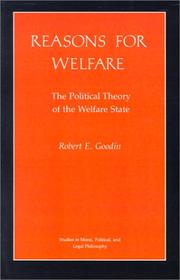| Listing 1 - 2 of 2 |
Sort by
|
Book
ISBN: 0691075948 0691021805 9780691075945 9780691021805 0691219419 Year: 1980 Publisher: Princeton, N.J.: Princeton university press,
Abstract | Keywords | Export | Availability | Bookmark
 Loading...
Loading...Choose an application
- Reference Manager
- EndNote
- RefWorks (Direct export to RefWorks)
Speculations about the effects of politics on economic life have a long and vital tradition, but few efforts have been made to determine the precise relationship between them. Edward Tufte, a political scientist who covered the 1976 Presidential election for Newsweek, seeks to do just that. His sharp analyses and astute observations lead to an eye-opening view of the impact of political life on the national economy of America and other capitalist democracies.The analysis demonstrates how politicians, political parties, and voters decide who gets what, when, and how in the economic arena. A nation's politics, it is argued, shape the most important aspects of economic life--inflation, unemployment, income redistribution, the growth of government, and the extent of central economic control. Both statistical data and case studies (based on interviews and Presidential documents) are brought to bear on four topics. They are: 1) the political manipulation of the economy in election years, 2) the new international electoral-economic cycle, 3) the decisive role of political leaders and parties in shaping macroeconomic outcomes, and 4) the response of the electorate to changing economic conditions. Finally, the book clarifies a central question in political economy: How can national economic policy be conducted in both a democratic and a competent fashion?
Economic policy and planning (general) --- Economic policy --- Macroeconomics --- Political science --- Politique économique --- Macroéconomie --- Science politique --- Economic policy. --- Macroeconomics. --- Political science. --- Politique économique --- Macroéconomie --- Administration --- Civil government --- Commonwealth, The --- Government --- Political theory --- Political thought --- Politics --- Science, Political --- Social sciences --- State, The --- Economics --- Economic nationalism --- Economic planning --- National planning --- State planning --- Planning --- National security --- Social policy --- Australia. --- Belgium. --- Cameron, David R. --- Carter, Jimmy. --- Congress. --- Democratic platform. --- Denmark. --- Downs, Anthony. --- Federalist Papers. --- Fiorina, Morris P. --- Ford, Gerald R. --- Germany. --- Goodhart, C.A.E. --- Heclo, Hugh. --- Hibbs, Douglas, Jr. --- Italy. --- Johnson administration. --- Kennedy, John F. --- Kirschen, E. S. --- Kramer, Gerald H. --- Lindbeck, Assar. --- Miller, Warren E. --- Nixon, Richard F. --- Rose, Richard. --- Schneider, Friedrich. --- Stokes, Donald E. --- Tobin, James. --- administrative agencies. --- austerity measures. --- bureaucracy. --- economic policy-makers. --- election dates. --- income equalization. --- inflation. --- macroeconomic policy. --- odd-numbered years. --- political ideology. --- social security. --- veterans benefits. --- Political aspects

ISBN: 0691077665 Year: 1988 Publisher: Princeton, NJ : Princeton University Press
Abstract | Keywords | Export | Availability | Bookmark
 Loading...
Loading...Choose an application
- Reference Manager
- EndNote
- RefWorks (Direct export to RefWorks)
Robert Goodin passionately and cogently defends the welfare state from current attacks by the New Right. But he contends that the welfare state finds false friends in those on the Old Left who would justify it as a hesitant first step toward some larger, ideally just form of society. Reasons for Welfare, in contrast, offers a defense of the minimal welfare state substantially independent of any such broader commitments, and at the same time better able to withstand challenges from the New Right's moralistic political economy. This defense of the existence of the welfare state is discussed, flanked by criticism of Old Left and New Right arguments that is both acute and devastating. In the author's view, the welfare state is best justified as a device for protecting needy--and hence vulnerable--members of society against the risk of exploitation by those possessing discretionary control over resources that they require. Its task is to protect the interests of those not in a position to protect themselves. Communitarian or egalitarian ideals may lead us to move beyond the welfare state as thus conceived and justified. Moving beyond it, however, does not invalidate the arguments for constantly maintaining at least the minimal protections necessary for vulnerable members of society.
Welfare state. --- Social justice. --- Bryan, William Jennings. --- Catholic Benevolent Fund. --- Gross National Product (GNF). --- Harrington, Michael. --- Heclo, Hugh. --- Joseph, Sir Keith. --- Keynesianism. --- Laffer curve. --- absolute needs. --- activist welfare state. --- adverse selection. --- air pollution. --- apartheid policies. --- bias and impartiality. --- capital distribution. --- clientelism in welfare. --- closet altruism. --- collective conscience. --- commercialization and services. --- conditional needs. --- contingent freedom. --- culture of poverty. --- defense contracts. --- disability insurance. --- duty of care concept. --- earnings, and labor supply. --- economic justice. --- entailed estates. --- extra-market allocation. --- farm relief. --- flagrant violation concept. --- formal discretion. --- fraternal organizations. --- generosity. --- gift relationship: altruism. --- humanism, and dependency. --- intentional discrimination. --- involuntary needs. --- laissez-faire. --- loss from exploitation. --- macroeconomics. --- mainstreaming. --- neighborhood schools. --- no choice standard. --- objective needs. --- obligations-based welfare. --- parenta. --- parole boards. --- personal deserts. --- positive discrimination. --- quality control. --- residential patterns.
| Listing 1 - 2 of 2 |
Sort by
|

 Search
Search Feedback
Feedback About UniCat
About UniCat  Help
Help News
News